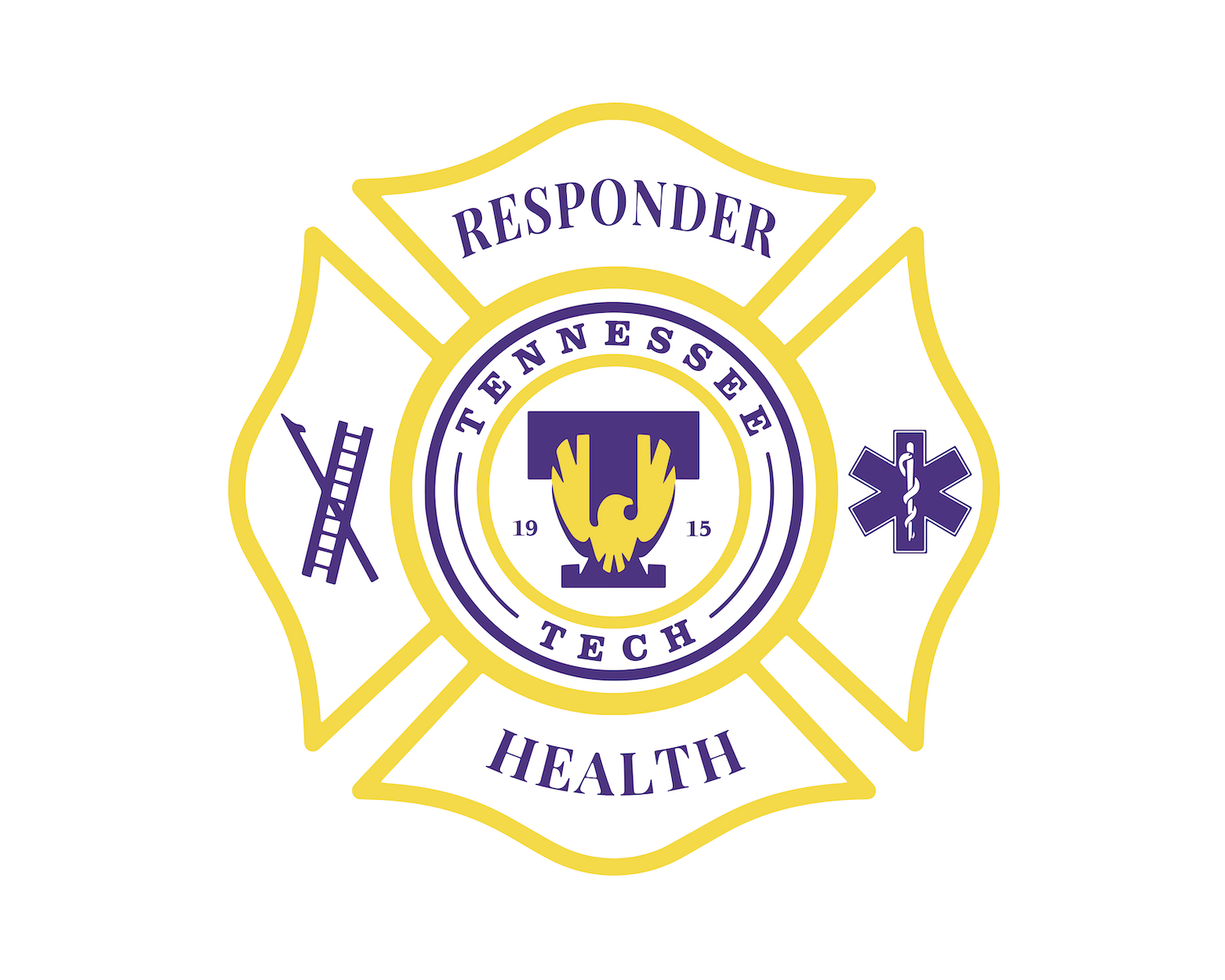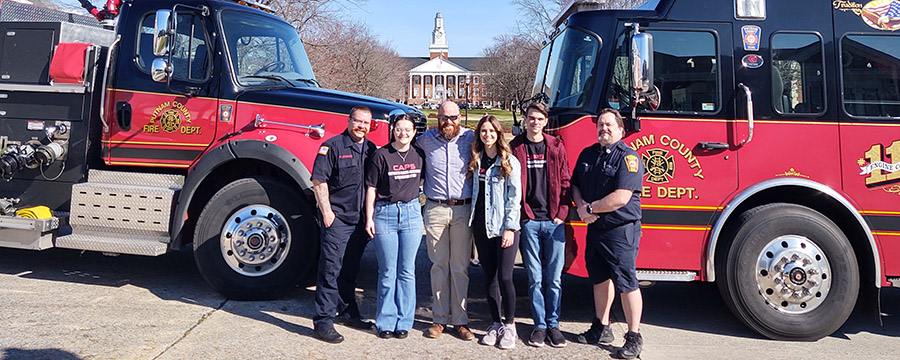Welcome!
Responder Health Lab
Our Mission
Provide support for those who serve others through high impact research projects and hands-on departmental assistance.
News & Projects - Join Our Email List
Stay up to date with the latest news and projects by joining our email list!

In the Press
- Shah, N. N., Steinberg, M. B., Caban‐Martinez, A. J., Austin, E., Burgess, J. L., Hollerbach, B. S., Edwards, D. L., Black, T. M., Black, K., Hinton, K. M., Kubiel, B. S., & Graber, J. M. (2023). Prevalence and predictors of skin cancer screening among a sample of US volunteer firefighters. American Journal of Industrial Medicine
- Edwards, D. L. (2023, February 6) Health and Wellness: Creating a behavioral health program. Firehouse (48)(2), 41-42.
- Edwards, D. L., Wilkerson, N. (2020) Emotional exhaustion and its relationship with suicide risk in emergency responders. PsychiatryResearch
- Edwards, D. L. (2016) Emergency responder resiliency: Predicting burnout with alexithymia, neuroticism, altruism, and sensation seeking. (Doctoral dissertation) ProQuest Dissertations Publishing. (UMI No. 10189068).
- Edwards, D. L. (2015). Progress in Firefighter Safety: Are We Getting the Real Story?, from http://www.beyondthefiremagazine.com/2015/10/18/ progress-in-firefighter-safety-are-we-getting-the-real-story/
Contact Dr. Derrick Edwards
Dr. Derrick Edwards (dedwards@tntech.edu) is a Tennessee Licensed Professional Counselor and a mental health service provider. He received his master’s degree from Tennessee Tech University and his doctoral degree from Trevecca Nazarene University. Dr. Edwards currently serves as an assistant professor of psychology at Tennessee Tech, and is the Principal Investigator of the Tennessee Tech Responder Health Lab. His research focus surrounds the psychological effects of being an emergency responder. Dr. Edwards joined the fire service in 2004 and is a licensed AEMT.

View Cancer Prevention Toolkit & Lavender Ribbon Report
Cancer Prevention Toolkit
Behavioral Health
- Resources
- First Responder Center for Excellence for Reducing Occupational Illness, Injuries
and Deaths, Inc.: 2130 Priest Bridge Drive, Suite 11 Crofton, MD 21114 | Tel: 443-302-2915. Website:
www.firstrespondercenter.org - National Volunteer Fire Council (NVFC) Share the Load Program: Offers resources and support for firefighters dealing with behavioral health challenges. Website: www.nvfc.org/share-the-load-program
- IAFF Center of Excellence for Behavioral Health Treatment and Recovery: A specialized facility offering treatment for firefighters dealing with behavioral health issues. Website: www.iaffrecoverycenter.com
- Safe Call Now: A confidential 24/7 helpline for first responders and their families dealing with behavioral health challenges. Website: www.safecallnow.org
- National Suicide Prevention Lifeline: A 24/7 helpline for anyone in crisis, including first responders. Phone: 1-800-273-TALK (1-800-273-8255) | Website: www.suicidepreventionlifeline.org
- First Responder Center for Excellence for Reducing Occupational Illness, Injuries
and Deaths, Inc.: 2130 Priest Bridge Drive, Suite 11 Crofton, MD 21114 | Tel: 443-302-2915. Website:
- Tips for Firefighter Behavioral Health
- Open Communication: Encourage open dialogue within your department about behavioral health challenges. Create a safe space for firefighters to discuss their feelings and concerns.
- Know the Signs: Educate yourself about the signs of behavioral health issues, such as depression, anxiety, and PTSD. Recognizing these signs in yourself and others is essential.
- Seek Professional Help: If you're struggling with behavioral health issues, reach out to a mental health professional who understands the unique challenges faced by firefighters.
- Peer Support: Establish peer support programs within your department to provide a network of colleagues who can offer understanding and empathy.
- Stress Reduction Techniques: Practice stress reduction techniques such as mindfulness, deep breathing, meditation, and yoga to manage stress and anxiety.
- Healthy Lifestyle: Prioritize proper nutrition, regular exercise, and sufficient sleep to support your overall well-being.
- Work-Life Balance: Strive to achieve a healthy balance between work and personal life. Taking time for hobbies, family, and relaxation can contribute to better mental health.
- Set Boundaries: Establish boundaries to prevent work-related stress from spilling into your personal life. Disconnect from work when you're off-duty.
- Destigmatize Seeking Help: Encourage a culture where seeking help for behavioral health challenges is normalized and seen as a sign of strength, not weakness.
- Resilience Training: Consider participating in resilience training programs that help you develop coping skills to navigate the challenges of the job.
- Peer Support Training: Train firefighters to recognize signs of distress in their colleagues and provide appropriate support.
- Regular Check-ins: Regularly check in with yourself and your colleagues to gauge your mental and emotional well-being. Support each other through difficult times.
- Know Your Limits: Be aware of your emotional and mental limits. Don't hesitate to ask for help or step back when needed.
- Stay Informed: Stay informed about available resources, workshops, and training related to firefighter behavioral health.
- By prioritizing behavioral health awareness and utilizing available resources, firefighters can take steps to manage stress, improve mental well-being, and create a supportive and healthy work environment.
Cardiac
- Resources
- First Responder Center for Excellence for Reducing Occupational Illness, Injuries and Deaths, Inc.: 2130 Priest Bridge Drive, Suite 11 Crofton, MD 21114 | Tel: 443-302-2915. Website: www.firstrespondercenter.org
- National Fire Protection Association (NFPA): The NFPA provides resources, standards, and guidelines related to firefighter health and safety, including cardiac health. Website: www.nfpa.org
- International Association of Fire Fighters (IAFF): IAFF offers various resources for firefighter health and wellness, including cardiac health. Website: www.iaff.org
- Firefighter Cancer Support Network (FCSN): Although mainly concerned with cancer prevention, FCSN provides resources on overall firefighter health, including heart health. Website: www.firefightercancersupport.org
- Tips for Responder Cardiac Health
- Regular Medical Check-ups: Schedule routine medical exams to monitor heart health, blood pressure, cholesterol levels, and other vital markers.
- Physical Fitness: Engage in regular exercise to improve cardiovascular fitness. Incorporate aerobic exercises, strength training, and flexibility exercises into your routine.
- Healthy Diet: Consume a balanced diet rich in fruits, vegetables, whole grains, lean proteins, and healthy fats. Limit processed foods, sugary snacks, and excess sodium.
- Weight Management: Maintain a healthy weight to reduce the risk of heart-related issues. Excess weight can strain the heart and increase the risk of hypertension and other conditions.
- Hydration: Stay properly hydrated, especially during firefighting activities. Dehydration can stress the heart and affect overall health.
- Stress Management: Develop effective stress-reduction techniques such as mindfulness, deep breathing, yoga, or meditation. Chronic stress can impact heart health.
- Sleep Quality: Prioritize getting adequate, quality sleep. Poor sleep can contribute to heart problems and impact overall well-being.
- Limit Smoking and Alcohol: If you smoke, seek help to quit. Minimize alcohol intake, as excessive consumption can negatively impact heart health.
- Know Your Family History: Be aware of any family history of heart disease, as genetics can influence your risk factors.
- Training and Education: Participate in training programs that focus on cardiac health awareness, CPR, and first aid techniques to respond effectively to heart-related emergencies.
- Work-Life Balance: Strive to maintain a healthy balance between work and personal life. Overworking and chronic fatigue can contribute to heart health issues.
- Communication: Discuss any health concerns with medical professionals and your department's health and safety officer. Open communication can help address issues promptly.
Cancer
- Resources
- Firefighter Cancer Support Network (FCSN): FCSN provides resources, education, and support for firefighters who are dealing with cancer. Website: www.firefightercancersupport.org
- National Fire Protection Association (NFPA): NFPA offers guidelines and resources to help reduce exposure to carcinogens and promote firefighter health and safety. Website: www.nfpa.org
- International Association of Fire Fighters (IAFF): IAFF provides information, research, and resources related to firefighter cancer prevention and support. Website: www.iaff.org
- The Firefighter Cancer Foundation: This organization focuses on raising awareness about firefighter cancer risks, prevention, and support. Website: www.ffcfoundation.org
- Tips for Firefighter Cancer Prevention and Health
- Use proper Personal Protective Equipment (PPE): Always wear appropriate gear, including turnout gear, masks, and respiratory protection, to minimize exposure to harmful toxins and carcinogens.
- Decontamination Practices: Implement thorough decontamination procedures after firefighting operations to remove potential contaminants from your gear, skin, and equipment.
- Limit Skin Exposure: Use barrier creams and wipes to minimize skin contact with hazardous substances during firefighting activities.
- Clean Living Areas: Keep living and sleeping areas separate from gear storage spaces to reduce exposure to contaminants. Regularly clean and maintain living quarters.
- Healthy Diet: Consume a balanced diet rich in fruits, vegetables, and whole grains. Nutrient-rich foods can support your immune system and overall health.
- Hydration: Drink plenty of water to help flush toxins from your body and maintain overall health.
- Regular Medical Check-ups: Schedule routine medical exams to monitor your health and catch potential health issues early.
- Limit Smoking and Alcohol: If you smoke, seek help to quit. Limit alcohol intake, as both smoking and excessive alcohol consumption can increase cancer risk.
- Sun Protection: Protect your skin from the sun's harmful rays when spending time outdoors. Use sunscreen and wear appropriate clothing.
- Physical Fitness: Regular exercise can support your immune system and overall health. Engage in both cardiovascular and strength-training exercises.
- Stress Management: Find healthy ways to manage stress, as chronic stress can impact your immune system and overall well-being.
- Awareness and Education: Stay informed about the latest research and developments in firefighter cancer prevention and support. Attend training sessions and workshops on the topic.
- Support and Communication: Connect with fellow firefighters, share experiences, and discuss cancer prevention strategies. Open communication can lead to positive changes within your department.
- Work-Life Balance: Strive for a healthy balance between work and personal life. Managing stress and finding time for relaxation are essential for overall well-being.
- By incorporating these tips and utilizing available resources, firefighters can take proactive steps to reduce their risk of cancer and promote their overall health and safety.

